
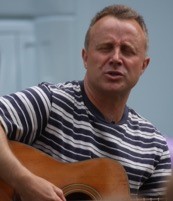
A school visit from Adam
Adam has been visiting schools to perform and run workshops for many years, so can offer a wide range of activities for a full or half day.
As well as writing for children, Adam is also a co-founder of Storytelling Schools, an international organization dedicated to working with children and teachers to teach and learn through the storytelling method. For more details visit www.storytellingschools.com
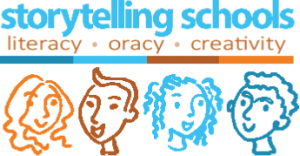
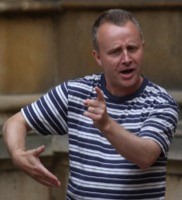
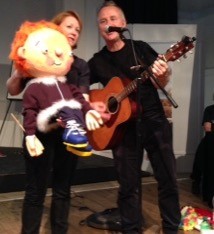 A typical author visit
A typical author visit
Adam often starts with a half-hour performance to the whole school, including nursery and foundation. This is a typical literary festival type event, focusing on a picture book, for example one of the George’s Amazing Adventures series. In the performance, the children will meet the puppet of the character George.
Storytelling Workshops
After the assembly, one option is to have a day of storytelling workshops. This is often the first choice for larger schools who would like all children to experience a workshop. In these workshops, Adam demonstrates how to HEAR MAP STEP SPEAK stories, a methodology unique to Storytelling Schools and one that works for every kind of learner. Following these sessions, it works really well if the KS1 and KS2 children go straight into a ‘warm write’, as they have the structure of the story clear in their minds and have both experienced and used high level language. Through these workshops, the children have the chance to practise telling the stories in their own words – effectively innovating as they develop their telling of the story and finding their own story voice.
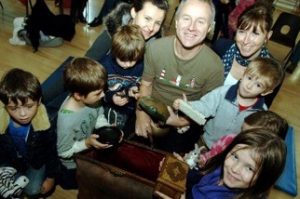 Storymaking Workshops
Storymaking Workshops
These work better in a classroom environment with a single class. Here Adam uses a story matrix and guided fantasy techniques to help pupils create and develop their own stories. These stories can be generated from pictures, objects or just pure imagination. For nursery and foundation children, this will be a shared experience, creating a story as a class.
Shared Writing
In these workshops, Adam uses a short oral story as a stimulus to explore how to write a great passage from a story, focusing on openings, how to write tension, great characters – anything you want to focus on to create a shared piece of work before the children work independently to do the same.
Book-specific Workshops
Sometimes schools are interested in focusing on one of Adam’s books. Often led by Q & A, Adam shares how he got the idea and how it developed into the finished book.
 Other Performances
Other Performances
Sometimes schools choose to use Adam’s vast knowledge of oral stories and request a storytelling performance. These can be anything from an hour-long telling of The Minotaur, telling the whole story arch from Europa to the death of Minos, or a range of shorter stories from around the world.
Picture Book Workshop
In these workshops, Adam and the children explore the stories in the George’s Amazing Adventures series through performance and story mapping – lots of fun! Using the books as a model, Adam facilitates a shared innovation using the concepts of obstacles, tricksters and helpers. The children then independently map and create their own adventure quest for George using story maps. This would then be a stimulus for the children to write and illustrate their own characters and adventure stories.
Workshops for Parents
Many schools ask Adam to organise after-school events for parents and carers. Here, the focus can be on reading, writing or storytelling in the home – sometimes a combination of them all. The sessions are full of practical activities parents can do at home to support their child’s development in all aspects of language.
INSET Training
Often schools add on a twilight training session following an author visit. The two-hour training takes participants through the methodology of Storytelling Schools (www.storytellingschools.com). Adam starts by telling a story that every teacher can use with their class. Here he demonstrates the HEAR MAP STEP SPEAK technique, considering calibration and extension. Following this, depending on time and the focus of the session, Adam explores how to elevate language as you move towards shared writing, identifying narrative foci and how to plan writers’ and language objectives. You could explore exemplar texts and toolkits that focus on shared writing before looking at what needs to be in place for innovation and invention to be of the highest quality.
Testimonials
Pie Corbett – Poet, writer and independent educational consultant
Headteacher, Oakmere Primary School, Northamptonshire
Other Information
Adam has a full up-to-date DBS Enhanced Certificate and £10 million public liability insurance.
A school visit from Charlotte
Charlotte has visited a wide range of schools in the UK and abroad and can offer a variety of sessions and workshops to suit your school’s needs.
A typical author visit
Charlotte usually starts the day with a whole-school assembly, showing and reading one of her books on the big screen, as well as talking about how she became a writer and how joyful and rewarding it is as a career. She could then run interactive sessions with different age groups, explaining how a book is made, from the initial idea to the finished text. Charlotte would read more of her books in this session, involving the children with dressing up and acting out the parts of characters.
Charlotte can also run bespoke workshops for different age groups. For example:
Key Stage 1
The focus here would be on picture books. Charlotte would explore the stories in the George’s Amazing Adventures series through performance and story mapping. Using the books as a model, she would facilitate a shared innovation using the concepts of obstacles, tricksters and helpers. The children could then independently map and create their own adventure quest using story maps. This would be a stimulus for the children to write and illustrate their own characters and adventure stories.
Key stage 2
Here, Charlotte could focus on one of her picture books, showing the stages of its development. To calibrate the session to the older children, she could explore how to create tension and drama in prose. Charlotte might use an exemplar text to show how this could be done. From this exemplar text, Charlotte and the children would create a writers’ toolkit, which she would then use to facilitate shared writing with the class. Once the children have invented their own story, they could then apply these techniques to their own writing.
Non-fiction workshops
Charlotte could tailor this workshop to many different topics, depending on what the children are learning that term. Charlotte would show the children her many non-fiction titles and talk through how she structures and researches her books, before looking at how writers produce engaging non-fiction text in their own words. In an extended workshop, it is fantastic for the children to create their own books. For example, using The Street Beneath My Feet as a stimulus, children could work in groups to create their own unfolding book.
Testimonials
Corinne Benham-Smith,
Priory Rise School,
Milton Keynes
Anna Neal, Assistant Head Teacher,
Wood
Farm School, Oxford
Adam and Charlotte are also happy to visit your school together to run literary festival style performances and separate workshops.
- Storytelling Workshops
- Storymaking Workshops
- Shared Writing
- Book-specific Workshops
- Other Performances
- Picture Book Workshop
- Workshops for Parents
- INSET Training
After the assembly, one option is to have a day of storytelling workshops. This is often the first choice for larger schools who would like all children to experience a workshop. In these workshops, Adam demonstrates how to HEAR MAP STEP SPEAK stories, a methodology unique to Storytelling Schools and one that works for every kind of learner. Following these sessions, it works really well if the KS1 and KS2 children go straight into a ‘warm write’, as they have the structure of the story clear in their minds and have both experienced and used high level language. Through these workshops, the children have the chance to practise telling the stories in their own words – effectively innovating as they develop their telling of the story and finding their own story voice.
These work better in a classroom environment with a single class. Here Adam uses a story matrix and guided fantasy techniques to help pupils create and develop their own stories. These stories can be generated from pictures, objects or just pure imagination. For nursery and foundation children, this will be a shared experience, creating a story as a class.
In these workshops, Adam uses a short oral story as a stimulus to explore how to write a great passage from a story, focusing on openings, how to write tension, great characters – anything you want to focus on to create a shared piece of work before the children work independently to do the same.
Sometimes schools are interested in focusing on one of Adam’s books. Often led by Q & A, Adam shares how he got the idea and how it developed into the finished book.
Sometimes schools choose to use Adam’s vast knowledge of oral stories and request a storytelling performance. These can be anything from an hour-long telling of The Minotaur, telling the whole story arch from Europa to the death of Minos, or a range of shorter stories from around the world.
In these workshops, Adam and the children explore the stories in the George’s Amazing Adventures series through performance and story mapping – lots of fun! Using the books as a model, Adam facilitates a shared innovation using the concepts of obstacles, tricksters and helpers. The children then independently map and create their own adventure quest for George using story maps. This would then be a stimulus for the children to write and illustrate their own characters and adventure stories.
Many schools ask Adam to organise after-school events for parents and carers. Here, the focus can be on reading, writing or storytelling in the home – sometimes a combination of them all. The sessions are full of practical activities parents can do at home to support their child’s development in all aspects of language.
Often schools add on a twilight training session following an author visit. The two-hour training takes participants through the methodology of Storytelling Schools (www.storytellingschools.com). Adam starts by telling a story that every teacher can use with their class. Here he demonstrates the HEAR MAP STEP SPEAK technique, considering calibration and extension. Following this, depending on time and the focus of the session, Adam explores how to elevate language as you move towards shared writing, identifying narrative foci and how to plan writers’ and language objectives. You could explore exemplar texts and toolkits that focus on shared writing before looking at what needs to be in place for innovation and invention to be of the highest quality.
Storytelling Workshops
After the assembly, one option is to have a day of storytelling workshops. This is often the first choice for larger schools who would like all children to experience a workshop. In these workshops, Adam demonstrates how to HEAR MAP STEP SPEAK stories, a methodology unique to Storytelling Schools and one that works for every kind of learner. Following these sessions, it works really well if the KS1 and KS2 children go straight into a ‘warm write’, as they have the structure of the story clear in their minds and have both experienced and used high level language. Through these workshops, the children have the chance to practise telling the stories in their own words – effectively innovating as they develop their telling of the story and finding their own story voice.
Storymaking Workshops
These work better in a classroom environment with a single class. Here Adam uses a story matrix and guided fantasy techniques to help pupils create and develop their own stories. These stories can be generated from pictures, objects or just pure imagination. For nursery and foundation children, this will be a shared experience, creating a story as a class.
Shared Writing
In these workshops, Adam uses a short oral story as a stimulus to explore how to write a great passage from a story, focusing on openings, how to write tension, great characters – anything you want to focus on to create a shared piece of work before the children work independently to do the same.
